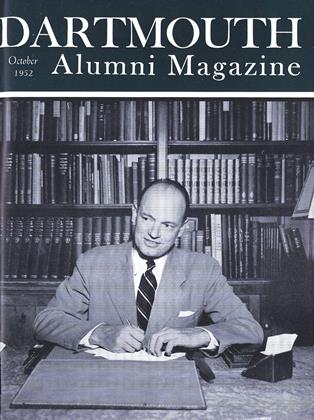On the Dartmouth athletic front this fall, everything seems to be following a familiar pattern, with football, soccer and cross-country teams romping about outdoors and with the football ticket office in the gym the focus of the DCAC's busy operations indoors. So far as these daily operations of the DCAC go, the pattern is indeed the same; on the policy side, however, an important change took place over the summer when academic control of intercollegiate athletics was formally established at Dartmouth and responsibility for policy was vested in the President of the College representing the Board of Trustees.
The amended Constitution of the Dartmouth College Athletic Council, duly approved by the Trustees, the Alumni Council and Palaeopitus, formalizes what has actually been the state of affairs for some time. With the Trustees now called upon to accept the financial responsibility for Dartmouth's program of intercollegiate athletics (general college funds covered a 1951-52 deficit of $79,710), the establishment of academic control was a natural and logical development. Dartmouth was the last of the Ivy Group colleges to retain an autonomous controlling body such as the Athletic Council, and if no other circumstance had called for the change that has been made, Dartmouth's being a party to the Ivy Group Agreement, creating a Presidents' Policy Committee, would have made such a step inevitable.
The amended DCAC constitution now contains this statement: "The purpose of the Athletic Council shall be to act as advisory to the President of the College representing the Trustees in matters of athletic policy, and further, in accordance with the vote of the Trustees dated October 29, 1934, and amended June 1952, to organize, direct, supervise, and manage all athletic activities of Dartmouth students such as involve the representation of Dartmouth College in competition with the representatives of other academic institutions or organizations, or otherwise as this authority may from time to time be modified or enlarged."
Along with this basic change, the status of the Director of Athletics, previously chosen by the Athletic Council, was altered to that of an administrative officer of the College, appointed by and responsible to the President. The director is now the executive officer and a member of the Council, which before consisted only of three alumni, three faculty and three undergraduate members, a tri-partite representation that continues unchanged.
The only other amendment of a major sort is the dropping of separate DCAC financial management and die incorporation of athletic income and expense into the regular financial operations of the College, under the Treasurer's supervision. On the subject of DCAC finances, Director of Athletics William H. McCarter '19 made this comment in his annual report for 1951-52:
"In establishing academic control and the responsibility of the College administration for intercollegiate affairs, the Trustees have graciously, though perhaps not cheerfully, accepted the financial responsibility as well. Since the present temper of the Ivy Group precludes any possibility, or indeed inclination, to expand into the 'big time' and thus increase our income, the cffort of the management must be directed toward holding clown our expense, and making the almost inevitable deficit as little unpalatable as possible."
 View Full Issue
View Full Issue
More From This Issue
-
 Article
ArticleDaniel Webster's College Days
October 1952 By EDWARD CONNERY LATHEM '51 -
 Article
ArticleThe New Dean . . .
October 1952 By JOHN HURD '21 -
 Article
ArticleDartmouth Men Active In the Big '52 Fight
October 1952 By C. E. W. -
 Class Notes
Class Notes1918
October 1952 By ERNEST H. EARLEY -
 Class Notes
Class Notes1905
October 1952 By GEORGE W. PUTNAM, GILBERT H. FALL -
 Class Notes
Class Notes1948
October 1952 By FRANCIS R. DRURY JR., ROBERT L. MERRIAM
C.E.W.
Article
-
 Article
ArticleDartmouth Alumni Represent College at Academic Functions in Recent Months
June 1939 -
 Article
ArticleA Two-for-One- Convocation and the Med School's 200th
NOVEMBER 1996 By E. Wheelock -
 Article
ArticleDoctor of Science
August, 1926 By GEORGE FISKE HARDY '88 -
 Article
ArticleDr. Divinity
DECEMBER 1998 By Jon Douglas '92 -
 Article
ArticleOLD CULTURE AND NEW
November, 1930 By President Hopkins -
 Article
ArticleBergen County
MARCH 1972 By WILLIAM H. TERRY '51







